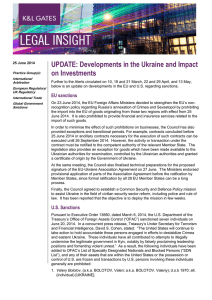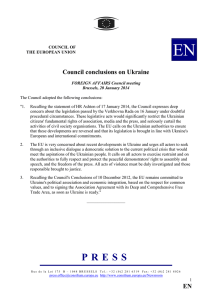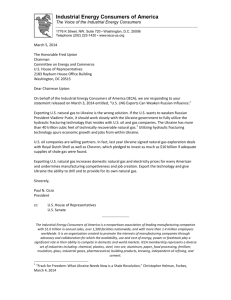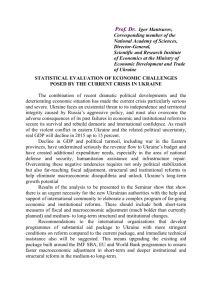Developments in the Ukraine and Impact on Investments
advertisement
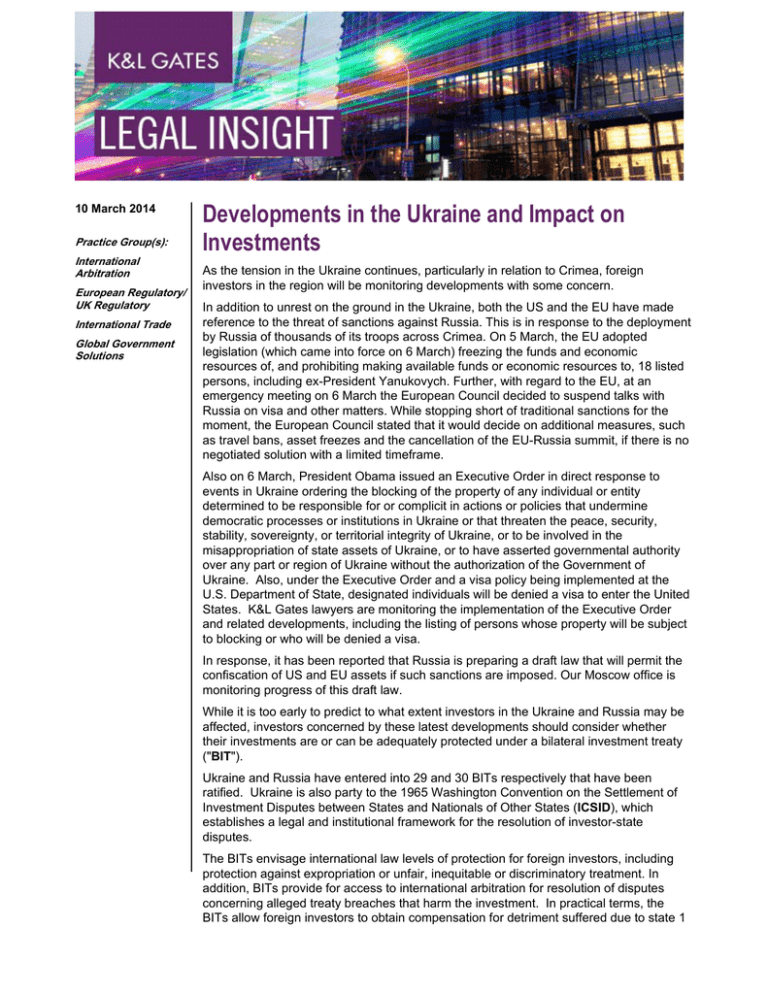
10 March 2014 Practice Group(s): International Arbitration European Regulatory/ UK Regulatory International Trade Global Government Solutions Developments in the Ukraine and Impact on Investments As the tension in the Ukraine continues, particularly in relation to Crimea, foreign investors in the region will be monitoring developments with some concern. In addition to unrest on the ground in the Ukraine, both the US and the EU have made reference to the threat of sanctions against Russia. This is in response to the deployment by Russia of thousands of its troops across Crimea. On 5 March, the EU adopted legislation (which came into force on 6 March) freezing the funds and economic resources of, and prohibiting making available funds or economic resources to, 18 listed persons, including ex-President Yanukovych. Further, with regard to the EU, at an emergency meeting on 6 March the European Council decided to suspend talks with Russia on visa and other matters. While stopping short of traditional sanctions for the moment, the European Council stated that it would decide on additional measures, such as travel bans, asset freezes and the cancellation of the EU-Russia summit, if there is no negotiated solution with a limited timeframe. Also on 6 March, President Obama issued an Executive Order in direct response to events in Ukraine ordering the blocking of the property of any individual or entity determined to be responsible for or complicit in actions or policies that undermine democratic processes or institutions in Ukraine or that threaten the peace, security, stability, sovereignty, or territorial integrity of Ukraine, or to be involved in the misappropriation of state assets of Ukraine, or to have asserted governmental authority over any part or region of Ukraine without the authorization of the Government of Ukraine. Also, under the Executive Order and a visa policy being implemented at the U.S. Department of State, designated individuals will be denied a visa to enter the United States. K&L Gates lawyers are monitoring the implementation of the Executive Order and related developments, including the listing of persons whose property will be subject to blocking or who will be denied a visa. In response, it has been reported that Russia is preparing a draft law that will permit the confiscation of US and EU assets if such sanctions are imposed. Our Moscow office is monitoring progress of this draft law. While it is too early to predict to what extent investors in the Ukraine and Russia may be affected, investors concerned by these latest developments should consider whether their investments are or can be adequately protected under a bilateral investment treaty ("BIT"). Ukraine and Russia have entered into 29 and 30 BITs respectively that have been ratified. Ukraine is also party to the 1965 Washington Convention on the Settlement of Investment Disputes between States and Nationals of Other States (ICSID), which establishes a legal and institutional framework for the resolution of investor-state disputes. The BITs envisage international law levels of protection for foreign investors, including protection against expropriation or unfair, inequitable or discriminatory treatment. In addition, BITs provide for access to international arbitration for resolution of disputes concerning alleged treaty breaches that harm the investment. In practical terms, the BITs allow foreign investors to obtain compensation for detriment suffered due to state 1 Developments in the Ukraine and Impact on Investments actions that violate BIT obligations, even if those actions are in conformity with domestic laws. Consequently, foreign investors who qualify under one of the relevant BITs could potentially, in the event of future loss, avail themselves of the investment protections and seek compensation for such loss. Whether any future measures by Russia (and/or the Ukraine) would violate the provisions of any particular BIT would depend on the nature of the measures and the specific terms of the relevant BIT. Some BITs include an exemption for measures necessary to preserve a party’s security interests. Sometimes these provisions are drafted to be “selfjudging” so that each party decides for itself whether it considers a measure to fall within the exception. Such provisions may be found to cover economic sanctions, for example. In any event, investors are well advised to consider whether their assets in the region are adequately protected. Should you have any questions regarding the described situation including possibilities for restructuring your business operations to secure BIT protection, please do not hesitate to contact the authors. Authors: London Vanessa C. Edwards vanessa.edwards@klgates.com +44.(0)20.7360.8293 Ania Farren ania.farren@klgates.com +44.(0)20.7360.8175 Ian Meredith ian.meredith@klgates.com +44.(0)20.7360.8171 Moscow William M. Reichert william.reichert@klgates.com +7.495.643.1712 Washington D.C. Daniel J. Gerkin daniel.gerkin@klgates.com +1.202.778.9168 Frank J. Schweitzer frank.schweitzer@klgates.com +1.202.778.9488 Donald W. Smith donald.smith@klgates.com +1.202.778.9079 Jerome J. Zaucha jerome.zaucha@klgates.com +1.202.778.9013 2 Developments in the Ukraine and Impact on Investments Anchorage Austin Beijing Berlin Boston Brisbane Brussels Charleston Charlotte Chicago Dallas Doha Dubai Fort Worth Frankfurt Harrisburg Hong Kong Houston London Los Angeles Melbourne Miami Milan Moscow Newark New York Orange County Palo Alto Paris Perth Pittsburgh Portland Raleigh Research Triangle Park San Diego San Francisco São Paulo Seattle Seoul Shanghai Singapore Spokane Sydney Taipei Tokyo Warsaw Washington, D.C. Wilmington K&L Gates practices out of 48 fully integrated offices located in the United States, Asia, Australia, Europe, the Middle East and South America and represents leading global corporations, growth and middle-market companies, capital markets participants and entrepreneurs in every major industry group as well as public sector entities, educational institutions, philanthropic organizations and individuals. For more information about K&L Gates or its locations, practices and registrations, visit www.klgates.com. This publication is for informational purposes and does not contain or convey legal advice. The information herein should not be used or relied upon in regard to any particular facts or circumstances without first consulting a lawyer. ©2014 K&L Gates LLP. All Rights Reserved. 3


